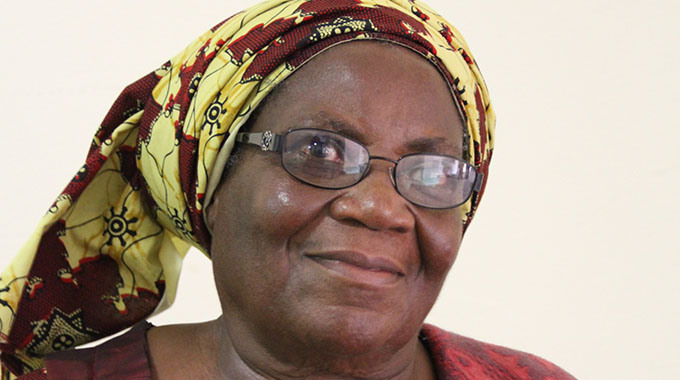Masuku lauds development projects

Mashudu Netsianda
Senior Reporter
VETERAN nationalist Cde Angeline Masuku, the only survivor from PF-Zapu’s five-member negotiating team during the Unity Accord talks with Zanu (PF) has lauded the Second Republic for stepping up the implementation of major developmental projects in Matabeleland region.
Cde Masuku was part of the high-powered committee which was tasked to oversee the integration exercise of Zanu (PF) and PF-Zapu after the December 22, 1987 Unity Accord between the two parties.
The Unity Accord, which was signed by former President, the late Cde Robert Mugabe and the late Vice President Joshua Nkomo, brought together erstwhile liberation movements of Zanu (PF) and PF-Zapu under the banner of Zanu-PF.
The Unity Accord is credited for ending Gukurahundi. Cde Masuku was part of the 10-member national integration committee, which was tasked after the signing of the Unity Accord, to preach the gospel of unity. The committee consisted of five Zanu (PF) members and five from PF-Zapu. Cde Masuku is the only surviving member from the PF-Zapu side who participated in the unity talks.
From the PF-Zapu side, the national integration team comprised of Cdes Masuku, Welshman Mabhena, Cyril Ndebele, Dr Kotsho Lloyd Dube and George Marange.
From the Zanu (PF) the team comprised Cdes Edison Zvobgo, Didymus Mutasa, Nelson Mawema, Herbert Ushewokunze and Tsitsi Mutambanengwe.
Cde Masuku spoke to our Bulawayo Bureau ahead of Unity Day on Wednesday. This year’s Unity Day commemorations are being held under the theme: “United Towards Vision 2030.”
Government has accelerated the pace of major developmental projects in the previously marginalised Matabeleland region as President Mnangagwa is walking the talk in his promise that no part of Zimbabwe will be left behind in the Second Republic’s development agenda.
Most of the projects that had been stalled for years, are now at various stages towards completion, bringing the much-needed relief to locals. Consistent with the National Development Strategy 1 (NDS1) and the country’s devolution thrust, the Government is making sure that development leaves no one behind.
Several key projects in Matabeleland are receiving increased attention under the Second Republic. Some of the notable projects being undertaken by Government include the construction of Lake Gwayi-Shangani in Hwange district, Matabeleland North, Tuli-Manyange Dam in Ntalale in Gwanda District, Matabeleland South, the revamping of Beitbridge Border Post and dualisation, upgrading and tolling of the Beitbridge-Harare-Chirundu highway.
The Lake Gwayi-Shangani project is a major component of the National Matabeleland Zambezi Water Project (NMZWP), which upon completion in December, is expected to provide a permanent water solution for Bulawayo and Matabeleland region.
Modernisation of the Beitbridge Border Post is in line with Vision 2030 of attaining an upper middle-income economy, and is one of the key projects being undertaken by the Government to promote the ease of doing business and trade facilitation.
Lupane Provincial Hospital in Matabeleland North is taking shape with some sections of the health institution having already been roofed.
The construction of the 250-bed hospital was part of Government plans since 2004 but was only scaled up following the coming in of the Second Republic whose thrust is to complete all projects that have been started by the Government. The development comes at a time when the Elitsheni Government Complex in Lupane is nearing completion.
In an interview, Cde Masuku, who is also ZANU-PF Deputy Secretary for Women Affairs, said unity must be maintained at all costs.
“Unlike in the old dispensation, we are now witnessing a lot of positive and tangible developments in Matabeleland under the Second Republic with major projects being implemented in the region. However, while we cherish the gains made through the signing of the Unity Accord in 1987, it is important that those in politics and Government emulate the President by talking unity and walking unity through availing equal job opportunities to everyone irrespective of their tribe,” she said.
Cde Masuku frowned upon tribalism, saying it was not a true reflection of unity among Zimbabweans. “We still have a long way to go in terms practicing unity because of tribalism. Beneficiaries of unity must not forget that they are what they are because of the peace and unity attained the hard way after the liberation struggle,” she said.
“As we commemorate 34 years of the signing of the Unity Accord, it is important for Zimbabweans to know that we are a unitary State and there should be equal job opportunities for everyone notwithstanding where you come from or which language you speak.”
“If we can have inter-tribal marriages what should stop us from embracing each other as one people?”
Cde Masuku noted that some people do not appreciate the importance and seriousness of the Unity Accord and the merger between the two revolutionary parties.
“Equally, if you look at the issue of national healing, there cannot be any meaningful progress as long as tribalism continues to rear its ugly head,” she said.
Before the signing of the Unity Accord, the two parties met and deliberated for several days before convening their special congresses to ratify the Unity Accord.







Comments